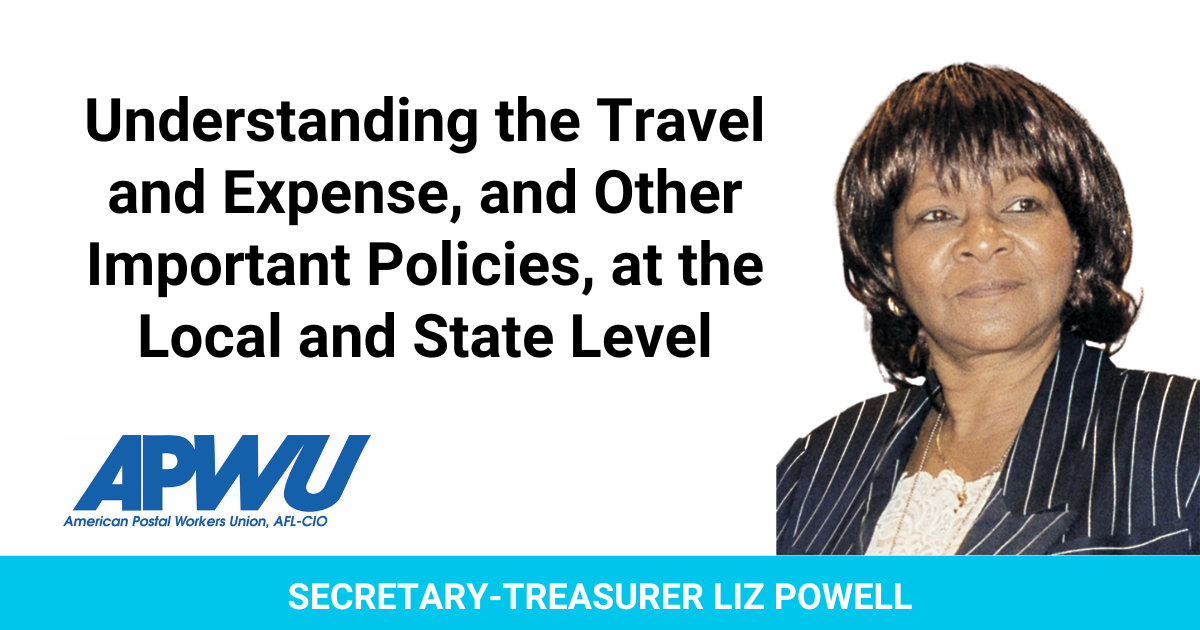Travel
Understanding the Travel and Expense, and Other Important Polices, at the Local and State Level

Since Travel and Expenses is a major category of union expenditures, the Department of Labor prefers a policy in writing that details how the local pays for and reimburses travel and business expenses.
The purpose of the Travel and Expense policy is to protect the organization’s funds and ensure uniformity and accountability. Locals should have control of their travel expenses and it should be clear that only expenses required for union business will be reimbursed. Locals should also adopt a Lost Time/Leave Without Pay (LWOP) policy, and a Credit Card policy. The policies should be established by the executive board and presented to the membership.
Travel and Expense Policy
The travel and expense policy should include, but not be limited to, the following travel expenses:
- Expense Filing and Approval.
- Travel Arrangements.
- Air Travel (suggest the union pay with union credit card or by check).
- Lodging/Hotel (Suggest the union pay with union credit card or by check, room and tax only).
- Ground Transportation/Airport Shuttle.
- Per Diem (GSA rate or Reimbursement-fully receipted).
- In-Town Meetings and Assignments.
- Personal Car Usage/Mileage.
- Car Rental.
- Lost-Time Reimbursement.
Lost Time/LWOP Policy
Required documentation includes:
- Constitutional language or motion to compensate LWOP.
- Properly approved PS 3971/Time and Attendance Collection System (TACS) Report.
- Properly approved local/state pay voucher.
- Reimbursement for Lost Annual and Sick Leave (after accumulating 80 hrs. of Code 084 Union LWOP).
Credit Card Policy
- Authorized users (recommend only president and treasurer).
- Limit the amount of expenses that can be charged without executive board approval.
- Original receipts for each transaction.
To fulfill Labor Management Disclosure Act (LMRDA) and Internal Revenue Service (IRS) requirements, all authorized expenditures are required to be properly documented with an expense voucher, original receipts, approved PS 3917 for Lost Time/LWOP, and mileage log, when applicable. It is important to establish what will be reimbursed when properly documented and receipted, and what will be compensated at the GSA rate. The only advance payment should be a per diem check, if your local uses the U.S. General Services Administration (GSA) plan. Local and state treasurers should visit gsa.gov to assist in determining the correct amount payable per diem by state and county. The GSA mileage rate for calendar year 2024 is 67 cents per mile. All expense vouchers should be submitted within 30 days of the expense being incurred.
The Travel and Expense policy should not be in your local constitution. This will permit changes to the policy without the formal constitutional amendment process. The policy should, however, be referenced in the constitution.
Article 16 Compliance!
The Secretary-Treasurer’s Department will continue to verify that locals are in compliance with Article 16 of the National Constitution. APWU locals who fail to abide by the regulations may have their Dues Check- Off (DCO) dues withheld until they comply or provide an explanation for non-compliance. Locals are required to provide verifi cation that they have complied with DOL and IRS fi lings as well as the APWU Constitution by providing a copy of their DOL reports and IRS Forms 990 to the Secretary-Treasurer’s Department after they have been electronically submitted. Also maintaining suffi cient bonding coverage in addition to the $5,000 bond provided to all APWU locals by the national union is required. Lastly, provide the results of local elections and a copy of the current local or state Constitution and Bylaws to the Secretary-Treasurer’s Department. ■







:max_bytes(150000):strip_icc()/roundup-writereditor-loved-deals-tout-f5de51f85de145b2b1eb99cdb7b6cb84.jpg)


